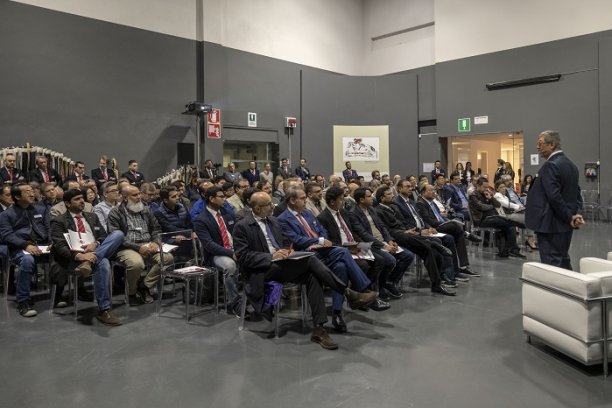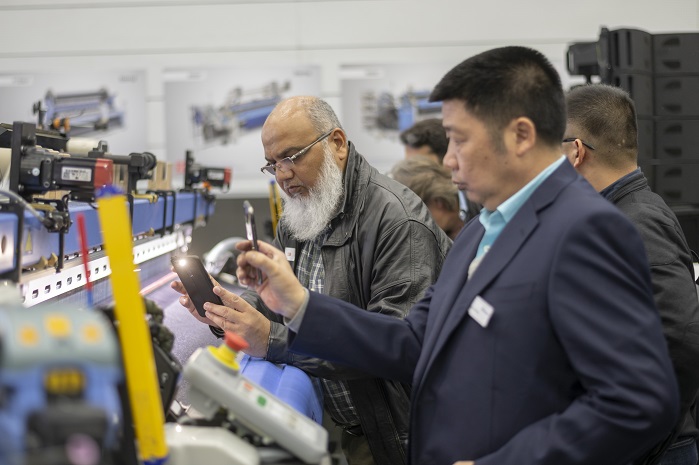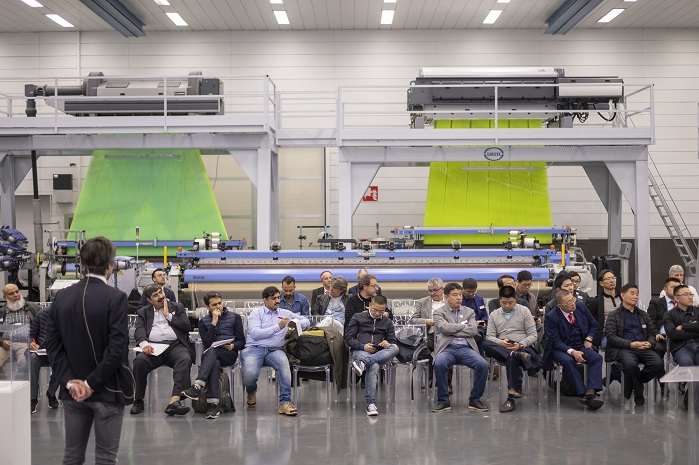
Itema strengthens presence in Turkey
The event, which took place in Colzate, Bergamo province, provided the unique opportunity to share ideas, experiences and best practices.

1st May 2019
Innovation in Textiles
|
Colzate
Itema Denim Day featured top executives from more than 50 denim mills. © Itema
Itema has hosted its first Itema Denim Day last month, a full day dedicated to trends and challenges in the denim sector, with a special focus on how to meet sustainable perspectives through the use of new business models and innovations.
The event, which took place at the headquarters of Itema Group in Colzate, Bergamo province, provided the unique opportunity to share ideas, experiences and best practices. The company, a leading manufacturer of weaving solutions, succeeded in organising an event that represented an exclusive and rare occasion for the industry to enter into debate involving all the actors of the denim supply chain.
Thanks to the support of in-house Itema professionals’ skills, assisted by an exclusive panel of speakers, this one-day event shed light on the most recent green innovations through a market and customer-oriented approach. The whole supply chain was the centre of a lively debate, which highlighted the connections between ethics and business, the most recent product and process innovations, key technologies, as well as a survey of the digitalisation in the value chain for the textiles sector.
Many elements have contributed to making the first Itema Denim Day a unique event. It featured in-depth overview of Itema and a detailed introduction of the top innovations in terms of cutting-edge machinery and technologies introduced by Carlo Rogora, CEO of Itema Group.

Itema introduced its weaving solutions exclusively designed and developed for denim manufacturing. © Itema
An exclusive panel discussed the topic Evolving sustainability in the denim chain. Towards a new business model, generating profit while creating value. International speakers took part in the debate, including Kutay Saritosun, Director of Fashion Brands, bluesign technologies; Marco Lucietti, Senior Adviser, Copenhagen Fashion Summit; François Girbaud, founder and owner, Marithé +; Federico Corneli, founder and CEO, haikure, CEO, CS Jeans; Alessandro Bondavalli, Merchandising Director Apparel, Guess Europe, and Christian Straubhaar, Sales and Marketing Director, Itema Group.
The event also highlighted the most recent rapier, air-jet and projectile weaving innovations designed and developed by Itema exclusively for denim fabrics.
This new technology, designed by ItemaLab, the Itema advanced innovation department with headquarters at Kilometro Rosso, is designed to completely eliminate the waste selvedge on the left side of the fabric, thus allowing to insert the weft yarns into the fabric without the need of additional yarns. iSAVER is said to lead to substantially reducing the waste of raw materials, with tangible benefits in terms of loom efficiency, cost reduction and energy saving.

The event took place at the headquarters of Itema Group in Colzate, Bergamo province. © Itema
“Suffice it to think that the weaver will save about EUR 2,000 a year on each loom, and our planet will gain even more. Indeed, for the first time in the history of weaving industry, a sustainable approach when choosing the machinery to be installed is possible,” the company reports. “Thanks to iSAVER, one thousand kilos of cotton per loom a year will be saved – i.e. 3% of total raw materials – which will prevent wasting 20 million litres of water.”
During the panel discussion, the main emerging focus appeared to be the need to precisely pinpoint new topics for innovation, which should aim at becoming truly sustainable and widespread. This means planning and constructing some restyling processes at strategic level, in order to create development models which are not just ethical, but also economical and profitable.
Sustainability is thus seen as a driver for business in the future, integrated within a company’s corporate vision, with raising education and awareness playing a key role. This should lead to a process able to translate sustainable change into performing outputs and technologies, allowing for improvement of the end product on the one hand, and of working conditions on the other side for many employees in this sector, especially in developing countries.

Business intelligence for the fibre, textiles and apparel industries: technologies, innovations, markets, investments, trade policy, sourcing, strategy...
Find out more